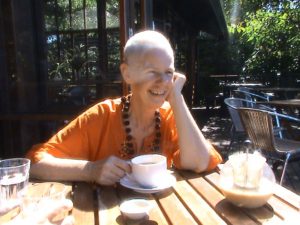Mataji’s experience in meditation is deep and broad – hers is a unique background and experience, and is rare in anyone’s capacity to teach and explain meditation in all its varieties.
She has been teaching Learn to Meditate programs since 1982, and training meditation teachers since 1989. She has led many meditation retreats.
Her personal practice is over 40 years (in July 2022!). Her first and preferred method is profound still-mind meditation which leads to a non-dualist understanding and appreciation of every day life. That means she has a constant recognition that the sense of her personal self (the I-Mataji) is formed by thinking and so cannot exist anywhere but in a bundle of thoughts. We all mistake that personal self for a “someone” that lives independently of the body. That mistake separates people from each other in a normally rather destructive way. Somehow, without that, we are all in it together, as one.
Immersed in the practice, she has been also immersed in the teachings of the no-mind, no-self philosophy of non-dualism that is common both to Yoga and Zen.
And yet her scope is unusually broad. She has also trained as a teacher of the health-enhancing practices of guided visualisation and stress-reducing meditation, at the Gawler foundation, with Ian himself as her mentor. And as the founding Secretary of the Gawler Foundation, she observed at first hand the effects of the modern methods on helping people optimise their physical and emotional well-being.
From her time at the Gawler Foundation, she learnt of the experience of Dr Herbert Benson whose ground-breaking research into meditation in the 1970s virtually brought meditation into the Western world as a stress-relieving health adjunct, and gave it legitimacy in an otherwise skeptical medical fraternity. From Gawler, she also understood the practice and influence of Thich Nhat Hanh’s Miracle of Mindfulness, which is now seen as the founding teaching of Mindfulness that is so commonly practised today as a variant of meditation.
On beginning to teach meditation, she returned to university to get an undergraduate qualification in Psychology followed by a Postgraduate Diploma of Health Psychology, the latter from La Trobe university. There she learned research-based academic perspectives on the links between stress, illness, meditation and mindfulness. She discovered that Herbert Benson’s influence is taught at an academic level, too. Thus she understands well the health perspective of stress and learning to release stress. She sometimes teaches a Resilience course on those aspects alone.
While the above is solid learning and practice, as it happens she also has mixed with and practised with many people from less formal and certainly less academic groups – eg ashrams, spiritual groups and even spiritualist groups. She has explored it all!
Mataji is a member of Meditation Australia as well as a life member of Yoga Australia.
You might enjoy reading Physical Body, Spiritual Body and Meditation – Being Comfortable with Reality

